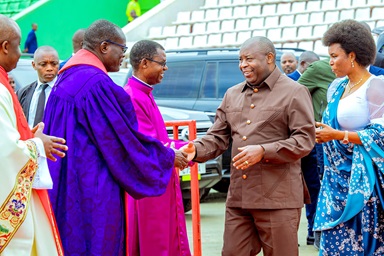Key Points:
- Moheto First United Methodist Church and Wema Health Foundation workshops focus on enriching emotional health and ending female genital mutilation.
- Girls and families learn about their rights, building their confidence through networks, friendship, guidance and psychosocial support.
- Founded in 2019 by United Methodist Deaconess Leah Nanyanga, Wema Health is a non-governmental organization that strives for universal health care and education. Since its inception, more than 200 disadvantaged children have received educational support, and 100 women have benefited from health care coverage.
Moheto First United Methodist Church, in partnership with Wema Health Foundation, conducted a workshop on female genital mutilation to help empower young women and girls, educate them about their rights and advocate for change.
Titled “Our Well-Being is Our Future,” the three-day session on gender-based violence drew 200 girls and women from the Moheto, Awendo and Oyani communities in Migori County, Kenya.
The workshop focused on the dangers of female circumcision or FGM (female genital mutilation), gender-related issues and child protection. Participants shared experiences, urging community groups to initiate awareness and advocacy and to lead and push for change.
Female genital mutilation is illegal in Kenya but is still forced on young girls in some areas. Cases increased after schools closed due to the COVID-19 pandemic, but organizations such as Wema Health Foundation are fighting the practice in ethnic communities. In addition, the government has pledged to abolish it by the end of 2022, eight years ahead of the worldwide deadline of 2030.
The Rev. Kennedy Mwita, senior pastor at First United Methodist Church, noted that the workshop came at a time when some in the community were conducting FGM practices.
“During this period,” Mwita said, “we were able to rescue three girls who had been scheduled for the cut. This was made possible through a joint initiative of counseling both parents and the girls, helping them see … the harmful effects.”
Major challenges face the efforts to end FGM. Some communities have developed unique ways of evading the law.
"The one major difficulty we face,” Mwita said, “is that girls are now having the cut at a younger age when they have no idea what has happened to them. The church has become particularly crucial in challenging the practice of FGM.”
According to UNICEF, girls and women from rural areas, living in poor households with less education, are more likely than others to experience FGM. Overall, 21 percent of girls and women ages 15 through 49 have undergone the practice.
Founded in 2019 by United Methodist Deaconess Leah Nanyanga, Wema Health Foundation is a non-governmental organization that strives for universal health care and education. Since its inception, more than 200 disadvantaged children have received educational support, and 100 women have benefited from health care coverage.
WHF offers girls a haven from forced early marriage and FGM. Girls and families learn about their human rights, building their confidence through networks, friendship, guidance and psychosocial support. Peer-counseling sessions help participants heal from emotional trauma.
Dominic Momanyi, an advocate involved with rescuing girls from the practice, says FGM still thrives in places like Migori because of strong cultural and religious beliefs.
“In Kuria culture,” Momanyi said, “a girl who does not go through the cut … is not clean enough to pray.”
Bilkis Gati, 15, a student at St. Mary Mabera Girls High School and a beneficiary of WHF educational support, said the workshop empowered her and her sisters to claim their rights.
“The training,” she said, “made me realize the power I have that can influence the changing of norms and practices that harm others, especially women and girls.”
For Kenyans living in extreme poverty, a girl's dowry is an important source of income. Many parents turn to child marriage, which historically entails female genital mutilation as a way of economic survival. These young girls confront many psychological and physical health dangers, depriving them of the opportunity to earn a living, obtain an education and become fully participating members of society.
Through the workshops, explained Lancer Wao, head of communications and coordinator for WHF, “the girls have been imparted with knowledge on menstrual hygiene, reproductive health, ending FGM and child pregnancy.” Participants also received clothing, sanitary products, books and pens.
Nanyanga, a Master of Divinity student at Drew University, noted significant progress toward abandoning FGM in Kenya. She acknowledged that additional efforts are needed across the country to eliminate undesirable old practices.
“In the 21st century,” she said, “no woman or girl should suffer or die as a result of FGM.” Eradication efforts, Nanyanga added, “must entail unwavering political determination and leadership, backed up by robust measures and grassroots collective efforts.”
Investing in education for girls plays a direct role in breaking the cycle of poverty across generations, Nanyanga said, and is vital in the protection of girls’ emotional and social development while providing them with opportunities for the future.
“All we need is greater sensitization to put an end to the practice,” she said.
Maiga is a communicator for the Kenya-Ethiopia Conference.
News media contact: Julie Dwyer at [email protected]. To read more United Methodist news, subscribe to the free Daily and Friday Digest.




